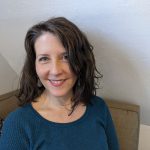

By: Gail Obenreder
“As soon as I started writing, backwards was the only direction I could look.”
Christina Durborow began writing nonfiction only about four years ago. Her practice developed “in fits and starts” over the course of two decades, but in 2017 “something clicked into place. I dared to call myself a writer and promptly got to work.”
Because she came to the practice of creative writing in mid-life, Durborow finds it hard to pinpoint her early influences, but she does remember reading “all of the books everyone else hated in high school . . . a fire sparked long before I got here.” Considering herself an “accidental student of history,” she also revels in classic Hollywood cinema, ballroom dancing, and “vintage anything,” the past continually pushing forward her recent work. And music inspires her as much as literature. “It’s almost like each album I’ve worn out in my lifetime represents its own chapter in my memory bank.”
As she began to write nonfiction, Durborow seemed to always find herself “back in the 90s, back in high school, back in the dark place.” The former college professor grew up in southeastern Pennsylvania, just over the state line, and she has been in the First State for 20 years. A Wilmington resident, she’s “lived in more places than I can count and yet they’re all somehow within the same 40-mile radius.” But rather than limiting her work, Durborow finds inspiration in her contained geography, with award-winning pieces that mine both academia and this region.
WHOSE LIFE MATTERS (2021)
I
Several years of teaching English 110 pass before I have the sense to create the no-no list. It happens the semester after a student insists on writing his paper, the one that is worth 35% of his grade, on the existence of God. The student recently accepted JC as his personal savior and the paper is a way to spread the Good News. But he begs off the presentation portion of the assignment. I let him record himself giving the presentation instead. He doesn’t look directly at the camera. The no-no list starts small: no papers about abortion or the death penalty or any other values-based topic. This is college. We argue about ideas, not morality.
Durborow is inspired by women of character and wisdom, “so-called difficult and unlikeable women everywhere. Seriously. I can think of nothing more inspiring than a woman who owns her strength without apology.” These role models help her as she’s challenged to unflinchingly face uncomfortable truths – “about myself, the people I love, the world around me.” And periodically in her writing practice, she needs to step away. “Clarity comes at a price.”
But as a writer, she is also breath-takingly rewarded by “the force and wonder of excavation in writing about the past [as it] reveals what’s been right in front of me all along.” Constantly inspired by what’s at hand, Durborow is lifted up by an irresistible love of flowers, everywhere – in pots, gardens, bouquets, and even in art. Her favorites are peonies, watching them blossom and unfurl “like little miracles happening on my kitchen table.”
The online writing communities fostered by the pandemic have not been entirely satisfying to her: Durborow misses the contact of “regular face-to-face writing with friends and colleagues, spending time in cafes and galleries, seeing live theater and music, all of the things that build accountability or provide inspiration.” And the civic and political crises of the past few years have made it difficult for her to concentrate. She is thankful that the Division’s Fellowship is helping to renew her commitment. “It’s honestly been a godsend, a much-needed directive to focus harder and get back to work already.”
The award will open new possibilities, and as “the best possible push forward,” Durborow plans to put it toward workshops, submission fees, and possible professional feedback to support her practice. Working through all the distractions of the past few years, the writer considers herself “a turtle, ever inching closer to illuminating the tyranny I wish to write against.”
Fellowship Home